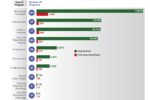- Joined
- Jul 21, 2018
- Messages
- 64
- Reaction score
- 113
Everyone talks about ortho being so competitive, but looking at the 2020 match statistics, ortho (1.5) is in line with most specialties ( Ratio of “Acceptable Applicants” Per Position Offered 1.2 1.2 1.5 1.3 1.3 1.7 1.3 1.4 1.5 ), and in fact perio (1.7) is the hardest to get into... am i missing something? is it just that the applicants for ortho are generally stronger?


